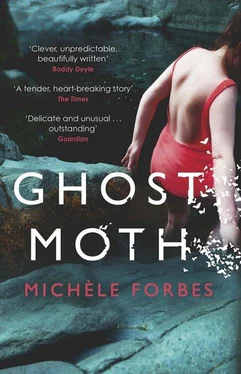It was not just the excited voices of the customers that accumulated as a ringing canopy under the decorative ceiling; it was every sound that was made in that room. It was the screeching of chairs on the wooden floor as people marked their arrivals and departures, and the jittery creaking of adjustment as they positioned themselves comfortably in their chairs at the small tables covered in white tablecloths. It was the clanging of the cutlery on silver trays by the exasperated waitressess, who smelled of sweat and soap. Their clumsy, deliberate, unrepenting handling syncopated with what seemed like their thoughts of private vengeance. It was the clatter of Delft by waiters too unimpressed by their own busyness to care. And it was the singular holler of orders being flung across the room like lone birds swept up in a wind-filled sky.
Wasn’t it as though the light had created them? He and she and all life in the Café Royal? she thought. They glistened. Everything glistened. The Art Deco lamps suspended from the high ceiling were like large, glowing soup bowls dropping into the cloud of sound. Light ricocheted off the gilt-edged mirrors on the four walls, off the glass display cabinets, off the silvered glinting slices of knives, forks, and spoons, off the swinging glass doors that led into the kitchens, off the pearls and paste that hung around the porcelain necks of the fine ladies. Not even the plumes of smoke rising from the cigarettes of the customers diminished its radiance.
It was its own world.
The large doors leading into the tearooms from the foyer swung backward and forward as people bustled in and out. Nearby, a high-spirited couple chatted about a film they had just seen. Other people were looking out for the arrival of friends. Four young women sitting together chimed together like a carillon, their words ringing around them. One woman sat on her own just to the left of the doorway, every so often lifting her head to view those coming and going. She twisted her teacup on its saucer, occasionally tipping it to peruse its contents. As she lifted the cup to her mouth, small drops of tea fell onto the saucer like brown baby lemmings falling into a shiny white sea.
Never before had she seemed so aware of the detail of her surroundings. Never before so keenly as this.
Tom managed to order a pot of tea from a waitress who, as she arrived to take their order, was already leaving them. There was no point of stillness where the relationship between customer and waitress was acknowledged. The waitress’s front teeth stuck out and her pen did not stop moving on her order pad. She was a dreary creature in this circus of glass and light. She kept writing and walking, creating for herself a novel of calories and libations. She wove her way through the tiny alleyways between tables without needing to look where she was going, her front teeth leading the way.
A huge pot of tea arrived almost immediately, deposited at their table en route as it were. The waitress was gone. Tom opened the lid of the teapot, his fingers protected by a paper napkin. Tea leaves floated in hot water; it had not yet become tea.
“How many have you pocketed?” Katherine said wryly. Tom looked puzzled and slightly taken aback. A moment passed. “The sugar lumps. They’ve been disappearing into your pocket.” Her voice was colored with mock accusation.
“Not exactly the worst habit in the world,” he replied defensively. Then his face relaxed. “I’ll eat them later, on the walk home. You don’t miss a trick. Or here”—he changed tack—“you have them, then!”
With this, he plunged his hand into his pocket and dumped the small handful of off-white lumps across the table and into her lap. She yelped with delight at having caught him out, throwing her head back with laughter, her skirt now cradling his saccharine contraband. Quick as a flash, he lifted the teapot and made as if he was going to pour the hot, steamy contents over her sugared lap.
“Do you like tea with your sugar?”
He looked at her, his eyes smiling right at her. She grabbed at the teapot to stop him and felt the hot steel of the teapot burning her hand.
They sat in the café as the evening unfolded and Tom told her a little about his work, pulling occasionally on his cigarette, about what shows he had designed costumes for, about his night-walks along the riverside. As he spoke, his eyes seemed never to tire of her and his smile remained gentle and confident. It seemed the easiest thing in the world for her to listen to his voice, which reached her through the noise of the café like sweet perfume.
Not every night, but most evenings, he said, he followed the narrow dirt path along the Lagan’s embankment until it brought him home. He remembered his father used to take him along the same path when he was a child, but only recently had he begun to walk it again. Occasionally, he would check the Albert Clock at the end of High Street as he left the tailors’ rooms, to time his journey. Sometimes, particularly on moonless nights, he said, the shadows on the embankment merged so densely with one another that he could not tell where the path ended and where the water began — both a weave of ink black. On those nights, he had to test the ground as he moved to see whether hardened earth or yielding wet lay beneath his feet. He had to sniff the air to sense whether what lay before him was the thickness of clotted vegetation or the thin, cool envelope of the river’s breeze. Not even the orange light that eased across the river from the heart of the city could guide his way.
“We’ll walk the embankment together,” he said “some night when the moon is full. I’ll show you.”
Yes, yes, she would like that. She would like them to walk the embankment together, she said. She was enthralled by the way in which he seemed to draw joy from everything around him. Her world seemed wider.
When Tom walked her home through the city, people moved around them like eddies and currents before a squall. He sang to her along the upward slope of the Mountpottinger Road, past Cluan Place, across the junction at Beersbridge Road, past the Unitarian Church with its sign saying THE LORD GIVETH AND THE LORD TAKETH AWAY. His voice was so smooth, it had made her want to weep. He sang the “Indian Love Call” and “We’ll Gather Lilacs in the Spring” as they walked past The Mount, past Paxton Street. He bought her an ice cream at Fus-cos, near John Long’s Corner, and then sang her a vanilla and raspberry serenade as they crossed Isoline Street. A dome of soft memory in the making, creamy white, trickled with sugar sweetness, berry-berry red. Their tongues tasted childhood and their lips chilled and they walked together, creating a song line through east Belfast.
They walked on down the final slope of the road until they reached the flat where Katherine lived. Popping the last of his ice cream into his mouth as though it were a tiny dunce’s hat, he kissed her cheek, his lips cold white. As he walked away, she could hear him sing quietly to himself, his voice moving on a curl of night air.
She opened the street door with her key and made her way up the stairs to the flat where she lived above a chip shop. There was no effort to the climb; it was as though she were floating up the stairs. Never before had she felt this much alive.
Entering the flat, she was greeted by her mother in the hallway. Her mother held a side plate with the remains of a sandwich on it and was on her way out to the kitchen.
“Ah, Katherine”—her mother was unable to hide her disappointment—“George has been waiting all evening for you.” Katherine quickly looked at the clock in the hallway — it was now eleven o’clock — then back at her mother.
“What?” she replied with an immediate sense of alarm, and walked quickly into the parlor, where George was waiting. The “good” cups and saucers were sitting on the table next to him, gold-rimmed and lady-thin. But George obviously had had more than enough tea, and the cups sat idle, like a rejected lot at an auction. They sat like George sat.
Читать дальше












